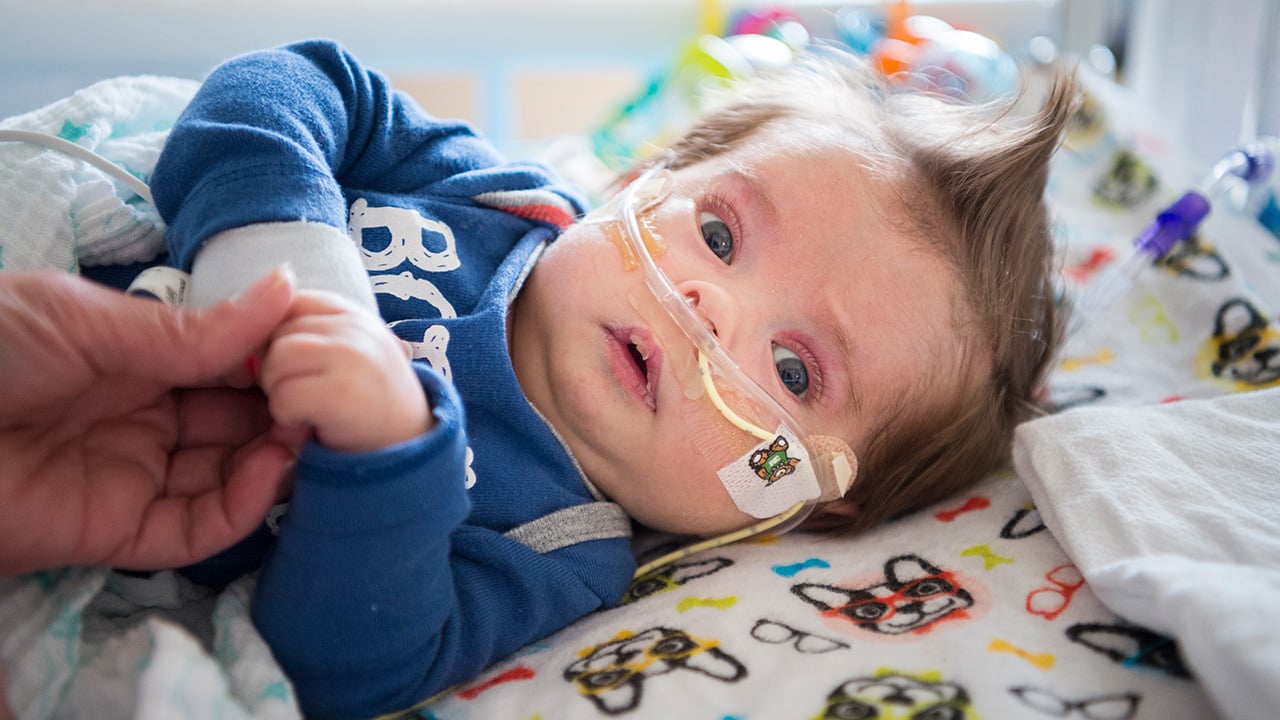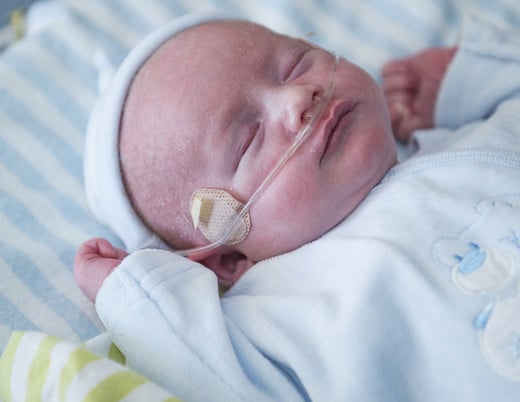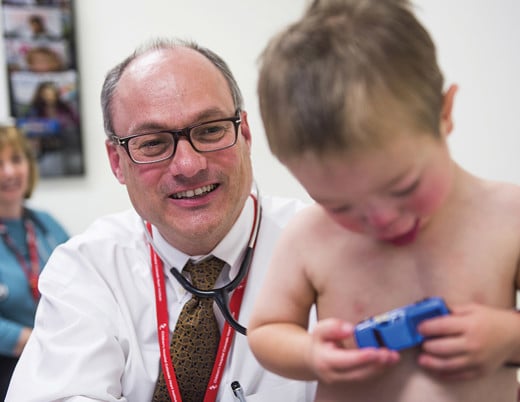Key takeaways
-
The CINCO interdisciplinary neurodevelopmental care program was developed and studied.
-
Simple, well-established interventions were designed collaboratively with parent/caregiver and medical professional input.
-
Successful program development included full, joint stakeholder participation, leveraging existing team members and workflows.
-
CINCO utilization rates significantly improved over the 18-month study period.
Children born with congenital heart defects are at risk for lasting neurodevelopmental delays, which can impact overall quality of life. Longer duration post-surgical hospital stays are one of the many complex predictors of poorer long-term neurodevelopmental outcomes, even when factoring in medical complexity and chronic conditions.
Aspects of inpatient hospitalization — particularly in an intensive care unit (ICU) — can be detrimental to neonatal and infant neurodevelopment:
- Extended time in bed with limited stimulation
- Reduced holding and skin-to-skin contact
- Frequent sleep interruptions
- Surgical hospitalization
- Caregivers/families are also impacted
- ≥80% of parents experience post-traumatic stress symptoms after their child’s surgery, which can persist for years and affect the child’s neurodevelopmental outcomes
Opportunities to modify these factors and improve neurodevelopmental outcomes include changing standard cardiac inpatient care practices and offering more support to patients and families.
Scientific literature suggests incorporation of neonatal ICU-like developmental care practices into cardiac ICUs may be beneficial, but there is a lack of practical guidance for establishing and implementing comprehensive cardiac inpatient developmental care programs.
At Children’s Hospital Colorado, many inpatient clinical team members provided some neurodevelopmental care at an individual patient level, but there was no systematic, integrated, universal approach for the cardiac ICU and cardiac progressive care unit.
To address this gap, researchers in the Heart Institute at Children’s Colorado introduced the Cardiac Inpatient Neurodevelopmental Care Optimization (CINCO) program. This initiative aimed to integrate neurodevelopmental interventions seamlessly into existing clinical roles and workflows, making them applicable to various pediatric cardiac inpatient care settings.
Methods: CINCO program development, implementation
This prospective single-site quality improvement interventional study was conducted at Children’s Colorado, a leading pediatric healthcare institution and a founding member of the Cardiac Neurodevelopmental Outcome Collaborative. The CINCO program aimed to enhance neurodevelopmental care practices for cardiac inpatients, particularly babies and toddlers with congenital heart disease.
- Designed to be cost-effective and seamlessly integrated into the existing workflows of clinical team members, reducing redundancy and enhancing efficiency.
- Implemented within the context of a large pediatric hospital with specialized cardiac care units
- Children’s Colorado’s inpatient cardiology service:
- 22-bed cardiac ICU
- 34-bed cardiac progressive care unit
The interdisciplinary team within the Heart Institute responsible for CINCO included professionals from various disciplines:
- Physical therapists, speech/language pathologists, occupational therapists
- Psychologists, neuropsychologists
- Cardiac social workers
- Inpatient cardiac child life specialists
- Physicians, advanced practice providers, nurses
Preparation
To design the program, a steering team of interdisciplinary content experts and clinicians was established to:
- Review existing literature on inpatient cardiac neurodevelopmental care
- Facilitate focus groups to obtain input and buy-in from clinical team members and parents/caregivers
- Determine the current and future state of neurodevelopmental practices across the Heart Institute
- Unite an interdisciplinary team to implement evidence-based neurodevelopmental intervention at key time points along the continuum of care
Interventions
CINCO order panels
These electronic medical record-based order panels aimed to create a more home-like environment for young cardiac inpatients.
- Activities to increase time spent out of bed, including time being held
- Cluster care procedures
- Minimize sleep disruptions, including skipping hands-on vitals during the night in patients who are medically stable and clustering medication schedules with care plans
Barriers to implementation addressed:
- Perceptions of instruction redundancy
- Concerns that overnight vital sign assessments in children would be skipped based on diagnosis or surgical stage, not clinical stability
- Ensuring continuation of orders after transition from Cardiac ICU to Cardiac Progressive Care Unit
Developmental plans and kits
Bedside developmental plans were created to provide individualized, developmentally appropriate activities for patients.
- Patients who could benefit were identified during the existing weekly therapy meeting
- Plans updated weekly to include any activity restrictions as well as a goal from each therapy (physical, occupational, speech/language)
- Complementary age-specific kits with toys, books, and activities distributed to families at first parent/caregiver meeting to support neurodevelopmental care in the hospital and at home
Barriers to implementation of kits addressed:
- Identification of the most appropriate person to order, restock kits
- Supply chain issues
- English-only board books
Volunteers
Specially-trained Heart Institute volunteers were recruited to provide developmental stimulation to patients, complementing the work of healthcare professionals.
- Underwent specific training to increase understanding of and comfort with children with heart disease
- Worked closely with clinical staff to deliver interventions from the developmental plans
- In this way, volunteers were leveraged as “therapy extenders,” increasing the frequency of working on developmental plan activities during the week
Parent/caregiver education and care
Educational materials were developed to empower parents and caregivers with information on promoting their child's neurodevelopment while in the hospital.
- Guidance on balancing caregiver presence and the need for self-care, as well as how to partner with the clinical team and advocate for your child during hospitalization
- Caregiver mental health, including risks for post-traumatic stress, anxiety, and depression
- Handouts included in the admission resource folder and reviewed with families by social workers
Developmental care rounds
Weekly interdisciplinary rounds were conducted in patients' rooms.
- Pre-meeting with the interdisciplinary team before rounding on patients, which were prioritized by neurodevelopmental risk and/or length of stay
- First launched in the Cardiac Progressive Care Unit, then the Cardiac ICU
- Provide developmental education and supportive interventions to families
- Helped ensure effective implementation of CINCO intervention
Analysis
The target population was patients aged 0 to 2 years old admitted to the Cardiac ICU or Cardiac Progressive Care Unit for at least 7 days.
Three plan-do-study-act cycles were completed at 6-month intervals:
- Focus on implementing order panels, developmental plans and kits, caregiver support handouts, volunteer program
- Assess implementation and overcome barriers to successful integration
Process aims:
- Implement and increase use of the CINCO order panels, developmental plans and kits, and caregiver support handouts from 0% to 50% by March 1, 2022
- ≥500 hours of specialized CINCO volunteer direct patient contact, performing neurodevelopmental interventions and supportive care by March 1, 2022
Results: CINCO interventions, volunteer engagement boosted
- Over a period of 18 months, there were 619 admissions of qualifying patients.
- CINCO interventions increased over time, with significant improvements observed in the utilization of order panels across the plan-do-study-act cycles
- 0% to 55% by March 1, 2022
- Cycle I compared to Cycles II and III: p = 0.0163 and p = 0.0007, respectively
- Developmental plans, kits, and caregiver support handouts were also implemented for eligible patients, with most goals achieved by Phase III
- Percent implemented for eligible patients by Phase III:
- 51% developmental plans
- 36% developmental kits
- 43% caregiver support handouts
- Volunteer program provided ≥500 hours of direct patient interaction, focused on neurodevelopmental-directed activities
- Percent implemented for eligible patients by Phase III:
The study also explored demographic factors influencing CINCO utilization, revealing that younger patients with longer hospital stays, prematurity, extracorporeal membrane oxygenation history, and higher acuity surgical scores were more likely to receive CINCO interventions.
Importantly, the study assessed balancing measures, revealing a low rate of device dislodgments associated with CINCO orders.
Discussion and conclusion: CINCO program enhances neurodevelopmental care
The authors highlighted the importance of integrating interventions into existing clinical workflows, involving key stakeholders and parents/families, and maintaining staff education to sustain momentum. They also emphasized the need to track balancing measures to ensure the program does not inadvertently cause harm.
Limitations included:
- COVID-19 pandemic-related challenges, including delayed implementation of the volunteer program
- Incomplete data on some aspects of CINCO implementation
- Need for ongoing funding for developmental kits
Future steps for the CINCO program include:
- Adding more specific interventions
- Addressing health equity issues
- Expanding interventions to older patients
- Assessing the effects of the program on long-term neurodevelopmental outcomes
The study authors concluded the CINCO program was successfully implemented, which demonstrates its feasibility and acceptability. Study findings emphasize the importance of stakeholder buy-in, integration into existing workflows, and interrelated interventions. The findings provide valuable insights for improving neurodevelopmental care for young cardiac patients.
Featured researchers

Sherrill Caprarola, MD
Pediatric cardiologist
The Heart Institute
Children's Hospital Colorado
Assistant professor
Pediatrics-Cardiology
University of Colorado School of Medicine

Jesse Davidson, MD, MPH
Cardiologist, associate medical director
Child Health Research Enterprise
Children’s Hospital Colorado
Associate professor
Pediatrics-Cardiology
University of Colorado School of Medicine
Kimberly DiMaria, CPNP-AC
Pediatric critical care nurse practitioner
Children's Hospital Colorado

Melanie Everitt, MD
Director of Pediatric Heart Transplant
The Heart Institute
Children's Hospital Colorado
Professor
Pediatrics-Cardiology
University of Colorado School of Medicine

Sarah Kelly, PsyD
Director, Heart Institute Wellness Program
The Heart Institute
Children's Hospital Colorado
Associate professor
Pediatrics-Cardiology
University of Colorado School of Medicine

Kelly Wolfe, PhD
Director, Cardiac Neurodevelopmental Program
The Neuroscience Institute
Children's Hospital Colorado
Associate professor
Pediatrics-Neurology
University of Colorado School of Medicine





 720-777-0123
720-777-0123










